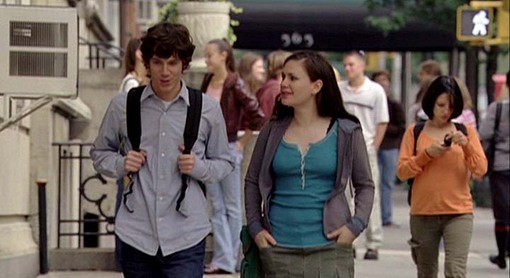Let me indulge my passion for operatic drama for a moment and say that I’ve seen Kenneth Lonergan’s “Margaret” four times now (the theatrical version and the new “extended cut” on DVD, twice each) and, while I’m watching it, I feel like I’ve never before seen a movie that fully recognized what human behavior is like. Sure, the focus is entirely on a certain demographic slice of human beings — mostly middle- to upper-class, educated, New York-dwelling, Judeo-Christian-atheist white people — but these people are alive and ragged and messy in ways few movie characters are allowed to be. (The characters, and the lives the movie depicts, are messy; the movie itself is exquisitely shaped according to its maker’s vision, and that was apparent from the theatrical cut.)
Of course, all movies are stylized and all characters, whether documentary subjects or fictional, are creations (of writers, directors, actors, editors, cinematographers and others) presented to us in a frame. Yet there are dimensions to the interactions in “Margaret” — the longing to be understood, the perverse impulse to (deliberately?) misinterpret someone else, the desire to inflict emotional sabotage on yourself or another person just because you can — that movies so often overlook in an effort to provide clear and clean drama in which everybody announces, bluntly and correctly, exactly what they mean to say.
In other words, as Lisa Cohen might say, “Margaret” calls bullshit on most other movies.

The “extended cut” of “Margaret,” on a DVD with the newly released Blu-ray disc of the theatrical version, is still “Margaret,” but with different tones, textures and rhythms. What happens to the characters is more fully articulated (with the middles of some scenes restored), but the movie also moves and breathes more openly. To me, the 188-minute version felt shorter than the 150-minute one because the flow was smoother; not as much stop-and-go-traffic pacing. At the Karlovy Vary Film Festival in early July, Lonergan told Damon Wise:
It’s just a different version, it’s not the definitive version. There’s more of it, and things that I’m happy to be able to put in. It’s funny, because, the older I get, the more difficulty I have deciding what to keep and what to keep and what to get rid of, and it was sort of a very relaxing epiphany to realize I didn’t have to choose.

I’m glad we don’t have to choose, either. For years, even dumb sex comedies and CGI action ‘toons have been released in post-theatrical extended (or “unrated”) versions, but Lonergan was interested in doing more than just reviving and re-inserting the darlings he cut for theaters. (Those could have been presented as trims and “deleted scenes,” anyway.) Instead, he approached the material from a slightly different angle. The movie feels as unwieldy and unfinished as ever, and always will, like “The Magnificent Ambersons” or “Apocalypse Now” or “Blade Runner,” which (each for its own unique reasons) remain perpetually provisional.
I’m tempted (as I often am) to make my own sort of Thomas Jefferson bible version from the two cuts available. Some things, I think, work better in the theatrical version and others work better in the extended cut. If you haven’t yet seen either, I’d suggest starting with the theatrical (the Blu-ray disc) because it’s more effective to see what has been added to the extended cut than it is to forget what you already know after you’ve seen the longer one.
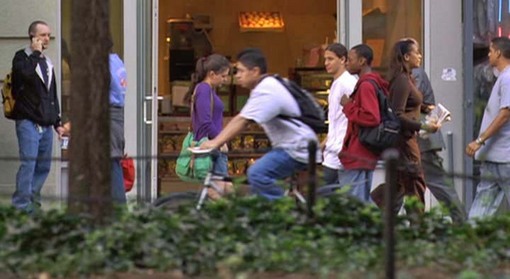
The extended cut goes into greater detail developing Lisa’s relationships with others — her lovesick friend Darren (John Gallagher, Jr.), her teacher Mr. Aaron (Matt Damon), her BFF Becky (Sarah Steele), and the ironic and worldly boy she likes, Paul (Kieran Culkin). There’s also a rooftop scene between her mom Joan (J. Smith-Cameron) and her suitor Ramon (Jean Reno) that gives us a much better sense of what they each want from their relationship.

But the most noticeable changes are on the soundtrack. Nico Muhly’s score has been mostly replaced by selections from opera recordings (which, according to Muhly, were what Lonergan used for the temp track). And a lot of “overheard” ADR dialog has been mixed into the film (rather over-emphatically in some cases), giving more of an impression of the other lives swirling around the movie’s main characters. It’s still, as I wrote, a movie about the overwhelming difficulties of communication between human beings, but the extended cut brings out more of what Bilge Ebiri so eloquently appreciated last fall:
Better than almost any other film I can think of, Margaret nails something very distinct about New York: the very public nature of life in this city. We do everything in front of other strangers here. We eat in front of them, we cry in front of them, we have our moral debates in front of them. Heck, we even die in front of them. It’s just part of the ecosystem of the place. Everything is a potential intersection, a potential quandary, and everyone a potential ally or an enemy. And for the most part, all these strangers ignore each other; in his review, Mike correctly notes all the various shots of people not listening to each other in the movie. […]
The sheer number of bystanders and extras that Lonergan’s camera captures is astounding, with even their voices often intruding noticeably on the soundtrack. The city and its eyes and ears — its total openness – feels present in every shot. There are no lonely streets in this film. No empty restaurants. And just about everybody somehow manages to navigate this world with remarkable ease…. The constant presence of others is just the background noise of life.

This is also highlighted in an elevator scene that’s brief and excruciatingly long, as elevator rides can be. And it involves only two people sharing a small space. Joan leaves the apartment after a frustrating encounter with Lisa and, once in the privacy of the elevator, cries openly. But the car stops and a woman gets on… who recognizes Joan from the advertising and press coverage of the hit play she’s now in, and wants to congratulate her on her success. So, Joan has to pull herself together and be “gracious.”

“Margaret” is teeming with strange and remarkable moments. After the accident, as Lisa gets out of her bloody clothes (she unthinkingly sits down and stains the bedsheets: “Good one, Lisa”) we hear pigeons cooing in the left channel; when she gets into the shower, she’s almost like Carrie after the prom, accompanied by a lush Pino Donaggio-sounding score. Near the end, when she storms out of the lawyer’s office and rushes to confront and shock Mr. Aaron (this time we know she really did have an abortion, but we only have evidence that the baby could be Paul’s), an excerpt from Mozart’s “Don Giovanni” gives the moment a comedic spin, underlining that, as Emily has said, Lisa (like most teenagers) sees herself as the lead diva in the opera of her own life.
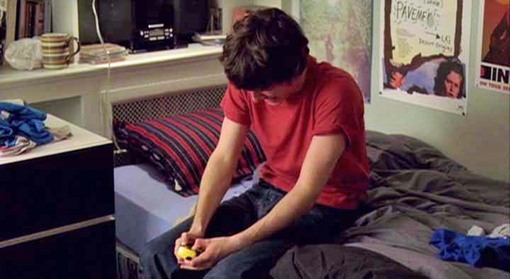
Darren was a slight, peripheral character in the theatrical release. He asks Lisa to a movie (maybe a “date,” kind of), sits on the floor at a party and makes out with her a little after she snorts coke with Paul in the bathroom, and then breaks down in tears when he calls her (Paul is on his way over to her place to relieve her of her virginity, though Darren doesn’t know that) and she says she doesn’t feel like talking. The scene in which he cries by himself in his bedroom is moving, but seems like an overreaction (what? a high-schooler having an emotional overreaction?!). But in the extended cut his relationship with Lisa is more complicated. Strangely, Lonergan has chosen to play a too-brightly-mixed brass jazz tune (a Louis Armstrong recording?) over the scene, so loud it almost drowns out the dialog. I’m not sure why.
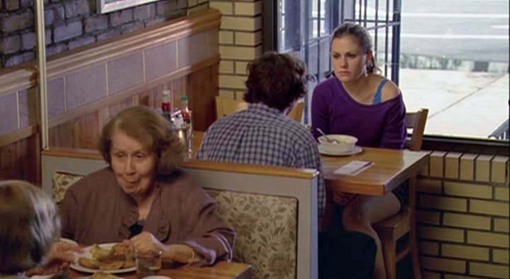
In a “new” scene that precedes this one, we see Lisa and Darren, his back to the camera, at a front corner table in a restaurant. But instead of their conversation, we hear the women seated behind him, and two men talking at a table mostly out of frame to the right (apparently). The camera slowly zooms in on Lisa and Darren, until we hear her quietly say that she doesn’t think of him as a boyfriend, but just wants to be friends. Then there’s another scene, at a rehearsal of a school play, in which she tearfully her love and friendship for both Becky and Darren as part of a cast-and-crew bonding exercise. So, Darren’s tears don’t seem so melodramatic after all — he feels like Lisa is jerking him one way and then another.

One of my favorite additions is to the storyline I previously found least satisfying: In a breathtaking shot on Ramon’s balcony (it ought to be the most romantic of settings, like something out of Woody Allen’s “Manhattan“), Joan tries to explain to Ramon how audiences are reacting so much more enthusiastically to the play she’s in now that the reviews have told everyone that it’s good. He tells her not to put herself down, but that’s not what she’s doing; she’s just describing a fairly commonplace occurrence. After taking a moment to admire the view, she asks him if he thinks it’s a problem that they don’t have much in common and are always misunderstanding each other. He says: “Joan, I like you very much. But let’s not talk about what you are like or what I am like. That never makes a good result. Talk about it with your friends.”

Joan is taken aback. That’s so… not the way Americans (particularly American women) are accustomed to dealing with relationships. And yet, Ramon makes it seem so matter-of-fact that it doesn’t come across as entirely unreasonable. He offers to show her some photos of his family and, once inside, she keeps studying him, trying to figure out what makes him tick. And, it seems, her attraction to him is growing along with her curiosity. This man is different from the actors and artists in the social circles to which she has become accustomed. He’s from a different culture (Argentina), who speaks different languages (Spanish, French) and has an entirely different professional background (computer software — his company helps different computer systems communicate with one another). It’s all quite foreign to her, puzzling but enticing. Maybe someone from outside her realm of experience might offer her something new, something she couldn’t have forseen. I was reminded of something Mr. Aaron says to Lisa at the very beginning of the movie: “”Haven’t you ever developed an interest in something that you didn’t initially think you were going to develop an interest in? … Haven’t you ever been put in a new situation and found that, after overcoming its difficulties, you had developed a new set of skills and new experiences along the way?” (Lisa’s answer to both questions is “no.”)

That’s certainly an underlying pattern in “Margaret”: people finding themselves feeling out of their depth in unexpected situations and struggling to keep their heads above water. They make mistakes (lots of mistakes) for understandable reasons and murky ones, recognize them (or not), regret them, maybe even try to fix them… but they can’t find solid footing. The city, and their lives within it, will not hold still for them. So, Joan, for example, has to be a single mother to her kids (including a precocious and petulant teenage girl), an actress in a new play, and a divorcée dating a stranger from out of town — all at the same time.
The movie itself is as jazzy as it is operatic — but one in which the “musicians” aren’t listening very closely to one another. Every interaction is rife with impatient interruptions, extraneous distractions, premature misunderstandings, hasty judgments and dismissals.

And then there’s Emily (played by Jeannie Berlin, daughter of Elaine May), one of the most extraordinary, exasperating and terrifying creations in American movies. Emily, close friend of the late Monica (Allison Janney), may be the only character who stubbornly refuses to expand her horizons in the ways Mr. Aaron suggests to Lisa. There’s something admirable about her stolidity — but also something frightening, maybe even sociopathic. She is understandably defensive about her relationship with Monica, not wanting it to be exploited by anyone else — especially, perhaps, a callow girl who just happened to be there when Monica died, and who lied to the police about how it occurred, even if she tries to do the right thing later.
The first time we and Lisa meet Emily is at Monica’s memorial in Emily’s apartment. Most of the scene is a close-up of Emily’s opening remarks, with a few cutaways to others at the gathering. We sense right away that what Emily says about her friend probably also applies to herself, when she says that the goal of the get-together is to “pay tribute to her in a way that might conceivably not enrage her”:
I don’t want to tell anyone what to think, or how to feel. And I don’t want to kid myself about the stupid, meaningless way she died, because it would really make her throw up. But I don’t want it to become the summation of her life. Because it’s not. When her Lisa died, I said to her, “How can you stand it?” And she said, “First of all, I can’t. But I don’t want to take away the 12 years we did have and turn them all into leukemia. Because they weren’t.” So despite the fact that she got — ripped off, I do think it’s important to remember that Monica got a lot out of life. She was the most fully developed person I personally have ever know. She was also impossible to get along with, but that’s another story.
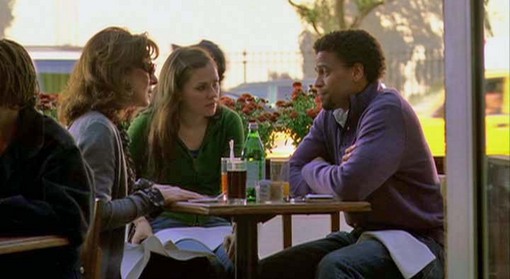
I do not for a moment doubt Emily’s sincerity, or her love for her friend, but I also got the feeling from her demeanor — even before I knew much of anything about her — that she had just delivered the eulogy she herself would like to receive. You can see immediately why a girl like Lisa would be somewhat in awe of Emily. She seems so mature, so aware and in control of who she is. It takes a while to see how much rage and turmoil she is concealing because she concedes nothing to anyone else. Watch the stiff way she sits and withholds even polite conversation during Joan and Lisa’s visit. If Emily doesn’t want anything from someone, she will clam up until they feel compelled to fill in the silences in the conversation. It’s a very powerful position to occupy. If she does want something (see the conversations with Dave, especially), she will impatiently challenge and prod and interrupt and charge ahead without giving others the chance to finish a sentence or explain a thought. Emily can be a fire-breathing monster, but still an authetically human one.
Recurring words like “want” and “understand” and “listen” and “responsibility” and “control” and “scared” are liberally woven into the dialogue — a lot of talk about meanings and intentions (from “I didn’t mean…” to “What did Shakespeare mean… ?”). And that’s what it comes down to. Like the other best (U.S.) release of 2012 that I’ve seen so far, Nuri Bilge Ceylan’s “Once Upon a Time in Anatolia,” “Margaret” is an existential mystery in which there is no solution, and the question is not “whodunnit” but “Who are we?” as human beings.

Emily states it most harrowingly when she blows up at Lisa for trying to make others part of her teenage opera, a scene that is slightly less harsh in the extended cut, thanks to a few minor adjustments. (She doesn’t repeat her admonishment, telling Lisa to look up the word “strident” when she gets home, so the scene, as Lonergan describes it in the script, is “still ugly,” but a little milder.) Lisa, echoing a classroom discussion about the empathy and naïvete of teens, says she cares “more than someone who’s older, because this kind of thing has never happened to me before!” Emily rejoins:
No, it means you care more easily! There’s a big difference. Except that it’s not you it’s happening to!… [Y]ou’re not the one who died of leukemia, and you’re not the one who just died in an earthquake in — Algeria. But you will be! Do you understand me? You will be. And it’s not an opera and it’s not dramatic… And this first-blush phony deepness of yours is worth nothing! … Do you understand? It’s now worth anything, because it’ll be troweled over in a month or two. And when you get older, and you don’t have a big reaction every time a dog gets run over, then, then we’ll find out what kind of person you are. But this is nothing! I’m sorry, but I didn’t start this conversation and I don’t play these games.
It’s one of the ugliest, most violent scenes I’ve ever seen,* and even if Emily’s right about Lisa’s penchant for (self-)dramatization, and even if we understand how threatened Emily feels about Lisa horning in on her life, It still feels cruelly unfair to the girl. And at least Lisa admits she doesn’t know who she is yet. She’s still becoming someone, while Emily is probably as “fully realized” as she’ll ever get.
To paraphrase what Lisa says about the bus driver, at least she knows she doesn’t know who she is. Emily may have no clue.
Then again, I could be totally wrong. And “Margaret” is big enough to accept that.
– – – – –
* There’s so much I had to leave out of this post that I would have loved to get into. I could write a book about “Margaret.” In fact, I’d love to…
P.S. What I mean by the headline “Three Faces of Margaret” is the interplay between the theatrical version, the extended cut, and the movie in your head that results from seeing the other two.
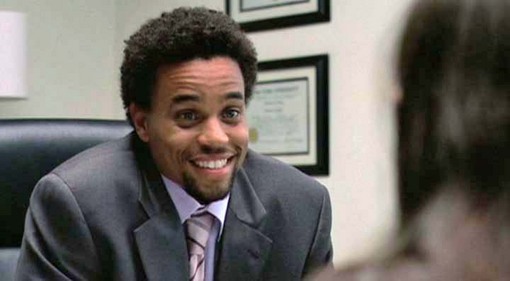
Above: One of my favorite moments in “Margaret,” a quick cutaway to Dave after Lisa says, “You are awesome!

